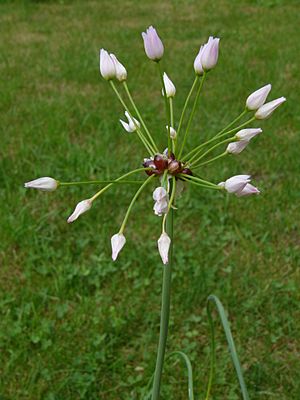One-leaf onion facts for kids
Quick facts for kids Allium unifolium |
|
|---|---|
 |
|
| Allium unifolium | |
| Scientific classification |
|
| Kingdom: | Plantae |
| Clade: | Tracheophytes |
| Clade: | Angiosperms |
| Clade: | Monocots |
| Order: | Asparagales |
| Family: | Amaryllidaceae |
| Subfamily: | Allioideae |
| Genus: | Allium |
| Species: |
A. unifolium
|
| Binomial name | |
| Allium unifolium Kellogg 1863
|
|
| Script error: The function "autoWithCaption" does not exist. | |
| Synonyms | |
|
Synonymy
Allium grandisceptrum Davidson
Allium unifolium Vieill. ex Greene 1894, illegitimate homonym not Kellogg 1863 Allium unifolium var. lacteum Greene |
|
Script error: No such module "Check for conflicting parameters".
Allium unifolium, also known as the one-leaf onion or American garlic, is a type of wild onion found in North America. This interesting plant grows naturally along the coast of California, Oregon, and Baja California. You can often find it in clay soils, including a special type called serpentine, at heights up to 1,100 meters (about 3,600 feet) above sea level.
Contents
What is Allium Unifolium?
Even though its name means "one-leaf onion," Allium unifolium usually has two or three flat leaves. These leaves can grow quite long, up to 50 centimeters (about 20 inches).
Plant Parts and How They Grow
The plant grows from a single, egg-shaped bulb. This bulb is usually about 2 centimeters (less than an inch) long. Sometimes, these bulbs form at the end of rhizomes, which are like underground stems that spread out from the main plant.
The plant also has a tall, round stem called a scape. This stem can reach up to 80 centimeters (about 31 inches) in height.
Flowers and Their Colors
The flowers of Allium unifolium are pretty, growing up to 15 millimeters (about half an inch) wide. Their petals, called tepals, are usually pink. However, you might sometimes see white flowers too! Inside the flowers, the anthers (the parts that hold pollen) can be yellow or purple.
Why is This Plant Special?
Allium unifolium is not just a wild plant; it's also recognized for its beauty. The Royal Horticultural Society has given it their Award of Garden Merit. This award means it's a great plant for gardens!
Images for kids
See also
 In Spanish: Allium unifolium para niños
In Spanish: Allium unifolium para niños
 | Janet Taylor Pickett |
 | Synthia Saint James |
 | Howardena Pindell |
 | Faith Ringgold |


